- Home
- Sandra Chastain
The Redhead and the Preacher: A Loveswept Historical Romance Page 2
The Redhead and the Preacher: A Loveswept Historical Romance Read online
Page 2
“I’d like to buy a dress and a bonnet and cape. Quickly, please. I—I have a pressing engagement.”
The seamstress studied her as if she thought Macky’s pressing engagement might be with a ragman, then turned to her rack. “I do keep a few skirts made up but they might be a little small for you and the only blouses I have are probably too big. I could alter a dress by tomorrow.”
“No, get the skirt and shirtwaist. I’ll wear them.”
The woman pulled the clothing from the rack and handed it to Macky. “You can try them on behind the changing screen.”
Keeping an eye on the door, Macky quickly shed her brother’s clothes and pulled on the unfamiliar women’s garments, wondering how on earth anybody could wear such things. By the time the commotion outside died down, Macky was wearing a pale blue shirtwaist and darker skirt over her brother’s drawers and had covered it all with a dark blue serge cape.
She reached inside the sack and withdrew enough money to pay for her goods and buy her ticket on the stage. Then she looked around for a means to conceal the rest. Getting on the stage holding a flour sack would only call attention to herself.
Hurrying now, she selected a tan-colored portmanteau in which she placed her old clothes and the flour sack. She added a second shirtwaist, a flannel nightgown, and a petticoat.
“Might I suggest this?” the seamstress said, holding out a blue velvet drawstring purse. “For your traveling money.”
Macky took the purse, paid for her purchases, and placed the remaining money inside. When the coins clanked together she looked around and picked up a lacy handkerchief to cushion the sound.
At the last minute she selected a blue bonnet with a pink rose on its crown and poked her red hair beneath it.
After registering the seamstress’s haughty disapproval, Macky glanced at herself in the mirror and bit back a very unladylike oath. The dressmaker was right. The blouse needed altering, but with the cape to cover it, nobody but Macky would know that it gaped open between the buttons. There was nothing she could do to hide a skirt that fell two inches short of covering her heavy work boots.
So be it. The people in Promise didn’t matter anymore and the citizens of Denver wouldn’t care what she looked like. She’d just keep traveling until she found a place where she could belong.
When the driver, Jenks Malone, crawled up on the stage, he cast a dubious eye on the odd-looking young woman who ran from the dress shop to the stage office, then boarded the coach at the last minute.
“Females,” he muttered, “always late.”
She was looking around as if she were searching for someone. Another minute and he’d leave her behind.
The only other traveler was polite and well mannered enough. According to the stationmaster, he was a preacher, “Brother Brandon Adams, headed for Heaven.”
But most preachers didn’t wear fancy clothes or a black patch over one eye.
And most preachers didn’t carry a Bible in one hand and a gun in the other.
Still, everybody along the line knew that the folks in Heaven were expecting their new minister. And if this man looked like the devil instead of a messenger of the Lord they wouldn’t care. But he made Jenks uneasy.
Jenks wasn’t sure that even a man of God could do much about the trouble in Heaven. If the federal marshal couldn’t find out who was running the miners off their claims, Jenks doubted the Lord would care.
Trouble was no stranger in the West. Lately the stage line had suffered a mess of it on the weekly run from Leavenworth to Denver to Salt Lake. Five days ago, Jenks had lost his own coach to an Indian attack. He’d managed to make his way to the next way station to wait for a new assignment. When the driver on the incoming stage came in roaring drunk, the stationmaster sent for Jenks to finish the western run.
Giving the horses a flick of his whip, Jenks moved the coach out. They were due in Denver by the next day, and there was Indian country to get through first. Indians and the Pratt gang who’d broken out of the territory prison and robbed the bank in Promise only minutes earlier. The deputy and one of the outlaws had been killed. But the sheriff had caught one and wounded another. Only Pratt and a young boy who’d been riding with them had escaped and they were likely heading west.
Jenks had a bad feeling about the trip, even if the Lord was on their side.
Chapter Two
John Brandon didn’t move as the new passenger boarded the stage. He’d been alone in the coach since he and the previous driver had buried the real preacher just inside the Kansas line.
That driver had found a bottle of whiskey in the preacher’s things, and by the time they reached the next station, he was roaring drunk. Fortunately, a substitute had been available to take the coach into Promise.
For Bran, the change in drivers was a stroke of luck.
His luck improved even more when the stationmaster in Promise took one look at Bran carrying the preacher’s Bible and assumed that he was the Reverend Adams. For Bran, that cover seemed ideal and he didn’t correct him.
Now there was another passenger, a lone woman, and it had been Bran’s experience that nothing appealed to a woman more than a man of God. If he allowed it to happen, he’d be forced to make conversation all the way to Denver.
Leaning his head against the back of the seat, his face covered by his hat, he hoped that she’d think he was asleep. He’d learned long ago that his senses could discover much without the aid of his eyes and that good luck was as valuable as good planning.
Good. He winced over that word. He’d lost any goodness in his life the same time he’d lost the sight in his eye.
Bran wished he hadn’t been able to see or hear the night the thieves pretending to be Indians had swooped down on his family’s small homestead along the Mississippi.
What he’d lived through that night had forever robbed Bran of love, a family, and any hope of a normal life. The outlaws had come for the money from a year’s crop of indigo and skins. They’d murdered everyone but the eight-year-old boy, who was saved by an arrow that lodged in his eye, causing a paralyzing pain that convinced the outlaws that he was dead. Then they’d burned the house. The last memory Bran had was of the gang leader, a silhouette of black against the orange flames of the cabin. That vision had been forever burned into his mind.
The commanding general at the nearby fort found the cabin burned to the ground and the boy half unconscious. He put the blame on the Indians he’d been sent to restrain instead of the river pirates.
Later, John had tried to explain that the gang of men who murdered his family were white but nobody would dispute the officer’s claim. The general offered John to a local farmer. Alone and filled with anger, he’d run away from the fort authorities, who were no better than the thieves. But the memory of his sister’s screams and the killer’s laugh had driven him ever since.
Later, the Choctaw Indian tribe who’d taken him in and saved his life called him Eyes That See in Darkness. They thought he had special powers; he could see in the dark. And he’d stayed with them, determined to learn to kill.
Later, he’d accompanied the tribe west to the lands they were assigned in Oklahoma. Along with his Indian brothers, he’d attended the missionary’s school where he studied the white man’s Bible, the same one his mother had read to him as a boy.
The wound in his eye healed, but nothing healed the scar in his heart, and as he grew into a man he made a vow that if it took the rest of his life, he’d find the outlaw who’d been responsible.
For the last fifteen years he’d wandered across the country, looking, searching, hiring himself out as a private avenger of evil. As a gunfighter he found and punished thieves and murderers of every kind. But the man he sought was still out there.
Always, he watched for a rangy man of authority with an odd laugh, to no avail. Now Bran was on his way to a little mining town called Heaven, just outside Denver in the Kansas Territory. He’d been hired to find out who was causing accidents and ho
lding up the gold shipments from a mine called the Sylvia.
Assuming the identity of the minister had seemed a ready-made cover for his mission. Now, in the coach, he amused himself by listening, feeling, allowing his mind’s eye to discover the identity of his traveling companion.
Female, he confirmed. The driver had called her ma’am.
A good build and firm step because the carriage had tilted as she stepped inside, and she’d settled herself without a lot of swishing around.
Probably no-nonsense, for he could see the tips of her boots beneath the brim of his hat. The boots were worn, though the clothing looked new. The only scent in the air was that of the dye in the cloth.
Practical, for she’d planted both feet firmly on the floor of the coach and hadn’t moved them; no fidgeting or fussing with herself.
Deciding that she seemed safe enough, he flicked the brim of his hat back and took a look at her.
Wrong, on all four counts. Dead wrong. She was sitting quietly, yes, but that stillness was born of sheer determination—no, more like desperation. She was looking down at rough red hands and holding on to her portmanteau as if she dared anybody to touch it. Her eyes weren’t closed, but they might as well have been.
The stage moved away in a lumbering motion as it picked up speed.
The woman didn’t move.
Finally, after an hour of steady galloping by the horses pulling the stagecoach, she let out a deep breath and appeared to relax.
“Looks like you got away,” he said.
“What?” She raised a veil of sooty lashes to reveal huge eyes as green as the moss along the banks of the Mississippi River where he’d played as a child. Something about her was all wrong. The set of her lips was meant to challenge. But beneath that bravado he sensed an appealing uncertainty that softened the lines in her forehead.
“Back there you looked as if you were running away from home and were afraid you wouldn’t escape,” he said.
“I was,” she said.
“Pretty risky, a woman alone. No traveling companion, no family?”
“Don’t have any, buried my—the last companion back in Promise.”
Macky risked taking a look at the man across from her. He was big, six feet of black, beginning with his boots and ending with the patch over his eye and a hat that cast a shadow over a face etched by a two-day growth of beard. There was an impression of quiet danger in the casual way he seemed to look straight through her as if he knew that she was an impostor and was waiting for her to confess. “What’s wrong with your eye?”
She hadn’t meant to ask. Asking questions would be considered bad manners. In the past, manners were something in which she’d never taken much stock. Now everything had changed. The memory of the dressmaker’s frosty glare made her acutely aware of her ill-fitting lady’s garments and bonnet.
Skirts and petticoats didn’t make a lady and she’d already reverted back to her old way of saying what she thought without regard for the consequences.
“I’m sorry. ‘A fool utterth all his mind.’ ”
Bran couldn’t help responding in kind. “ ‘Answer a fool according to his folly.’ ”
She looked at him in surprise. “Plato?”
“No, Proverbs.” He let a few seconds pass before he went on. “I lost the eye a lot of years ago.”
“Forgive me. Your eye is none of my concern.”
The man wearing the eye patch wouldn’t normally have continued the conversation, but he’d never come across a woman who not only read books, but quoted from them. His interest sharpened. He couldn’t resist the impulse to learn more about her. “You have a name?”
“Yes. Do you?”
“Indians call me Eyes That See in Darkness.”
Macky studied him carefully, giving the impression that she was measuring him as a man, not an enemy. “Why?” she asked with no attempt to conceal her curiosity.
“Thought I could see in the dark.”
“What do other people call you?” she asked.
He studied her in return. Though she was young, she neither played the coy young maiden nor the piously proper woman he was accustomed to. In short she met him head-on. He frowned. “Depends.”
“Fine, it’s your business,” she said and pressed her lips firmly together. She didn’t have to talk to him.
She gave the man in black a furtive look. His face was hard, chiseled with sharp edges, smeared in dark shadows. She knew better than to think he was interested in her. There was something about the Calhouns that turned people away.
Even the widows back in Promise who once made overtures to her father had cooled when her father spurned their attention. Later, when her brother, Todd, started hanging out at the saloon in town, those same widows quickly let Macky know that they had done their Christian duty in welcoming the Calhouns, but that welcome had come to an end. Thereafter, Macky had avoided the town.
Macky had missed Todd’s boyhood teasing but she didn’t miss the sullen, resentful man he’d become. She’d still had her father then, and that, she’d told herself, was enough. Todd would sow his wild oats and then come home. But he hadn’t.
Across the carriage, Bran was aware of the girl’s scrutiny. He felt himself giving her a reluctant grin. She was a feisty one, his peculiar-looking companion with wisps of hot red hair trying to escape her odd little hat. She had a strong face and a wide mouth. But what held him were green eyes that, no matter how frosty she tried to make them, still shimmered with sparks of silver lightning.
The Indians who’d named him would have called her Frozen Fire. She might be dressed like some dowdy schoolmarm, but there was more to her than her appearance indicated. In fact, he doubted that she cared much about clothing. And she damned sure didn’t know how to choose a hat.
“I’m called Bran,” he said slowly.
Bran decided she was definitely running away from something, but he couldn’t figure what. He should back off. Planning the job waiting for him in Heaven was what he ought to be doing. He would be working for a woman. He’d never worked for a woman before and she hadn’t liked his stipulation that his identity be kept secret.
John Brandon Lee had stopped using his real name fifteen years before when he’d killed a man who’d been beating an Indian boy. A warrant had been issued for John Lee’s arrest. The only thing that had saved him in the years since was the fact that the only witnesses had been Indians. They’d identified the killer by name but their descriptions had been deliberately vague and confusing. Nobody ever knew that in later years John had dropped that name and taken a new identity, that of a half-breed gunfighter called Night Eyes.
Now he’d surprised himself again by giving her his real name. There was a growing sense of intimacy inside the coach. She seemed to be genuinely interested in him as a person, but wary at the same time. He considered getting out, saddling the horse tied to the back of the stage, and riding into Denver alone.
Bran had always found women ready to make a casual relationship with him more personal. They seemed attracted to danger. But this one didn’t. And that cool independence had become a challenge.
Maybe a little conversation would shake the uneasy feeling that he was experiencing.
“What are you called?” he asked.
“Trouble, mostly,” she said with a sigh that told him more than she’d intended.
“That’s an odd name for a woman.”
“That’s as good as you’re going to get,” she added, lifting a corner of the shade covering the open window.
Good? There it was again. “Good is a rare quality in my life.” He took a long look at her. “But I’m willing to reserve judgment.”
He was doing it again—extending the conversation. Something about this young woman was intriguing. “Truth is, I’m a lot more likely to appreciate a woman who’s bad. Wake me when we get to the way station.”
Macky’s eyes flew open. She was ready to tell him where he could go, but the brooding one-eyed stranger
had covered his eyes with his hat and within seconds he was snoring. Macky hadn’t had much experience with men, but she had the feeling that he might be laughing at her. She ought to be used to that but somehow this time it was disturbing.
Well, two could play that game. With his face covered, he couldn’t be watching her. And no matter what the Indians thought about his sight, Macky didn’t believe he could see through his hat.
Through the crack between the shade and the window opening she watched for some time as the stage moved across the open prairie. But her eyes kept moving back to the man. It was just because she’d never seen a man with an eye patch, she told herself as she studied him more carefully.
His fine leather boots were splattered with mud as if he’d come a long way. She’d noticed a saddle strapped on top of the coach and a horse tied to the back of the coach. His black greatcoat showed signs of hard use but his trousers were of fine cloth. His shirt was white, tied at the neck with a thin black ribbon tie, and the striped fabric of the waistcoat looked like the one Papa always wore when he went into town.
Papa. A pang of regret pierced her. She’d left town so quickly that she hadn’t even stopped by his grave to say goodbye. But he wouldn’t have wanted her to grieve. Eternally optimistic, if he were the one sitting in the seat across from Macky he’d say, “Don’t look back, girl. Find a new star in the heavens.”
But the only star she was likely to find was the one pinned on a lawman’s vest.
Her father was a schoolteacher when Todd was born, barely making enough money to support his family. Todd was thirteen and Macky was eight when Papa had made the desperate decision to go West and make a new start running a trading post along the Missouri. But he’d been a better teacher than merchant. The move and poor health aggravated by the climate had hastened her mother’s death.
The only fond memory Macky had of that time was the daily exchanges she had with her father. They’d had little else to do except try to outwit each other with puns, hypotheses, and verbal exchanges.
During her mother’s long illness, all attempts to turn Macky into a real lady were forgotten. Instead, she had learned to use her mind and speak her thoughts. When Mama died, Papa had sold his store and, sight unseen, bought a ranch in Kansas. It was only when they got there that they found out the land was worthless.

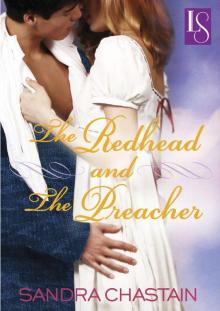 The Redhead and the Preacher: A Loveswept Historical Romance
The Redhead and the Preacher: A Loveswept Historical Romance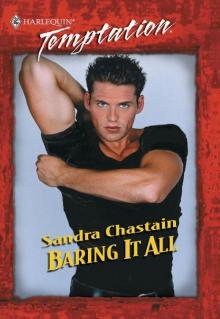 Baring It All (Mills & Boon Temptation)
Baring It All (Mills & Boon Temptation)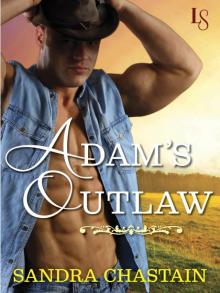 Adam’s Outlaw
Adam’s Outlaw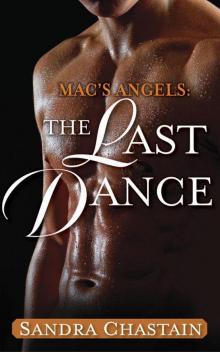 Mac's Angels: The Last Dance: A Loveswept Classic Romance
Mac's Angels: The Last Dance: A Loveswept Classic Romance Imaginary Lover
Imaginary Lover The Judge and the Gypsy
The Judge and the Gypsy Silver Bracelets: A Loveswept Contemporary Classic Romance
Silver Bracelets: A Loveswept Contemporary Classic Romance Penthouse Suite
Penthouse Suite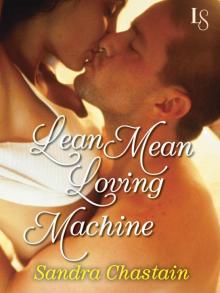 Lean Mean Loving Machine: A Loveswept Classic Romance
Lean Mean Loving Machine: A Loveswept Classic Romance Joker's Wild
Joker's Wild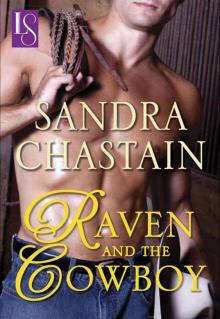 Raven and the Cowboy: A Loveswept Historical Romance
Raven and the Cowboy: A Loveswept Historical Romance Night Dreams
Night Dreams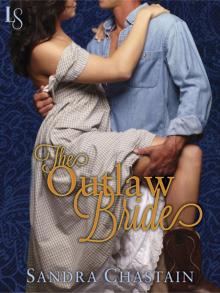 The Outlaw Bride
The Outlaw Bride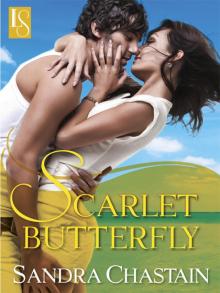 Scarlet Butterfly
Scarlet Butterfly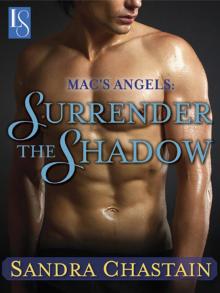 Mac's Angels
Mac's Angels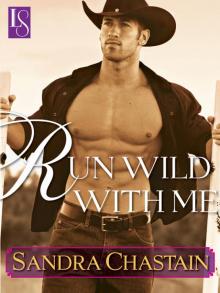 Run Wild With Me
Run Wild With Me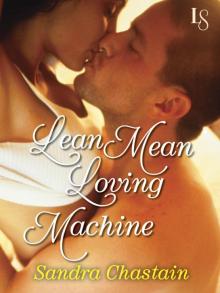 Lean Mean Loving Machine
Lean Mean Loving Machine